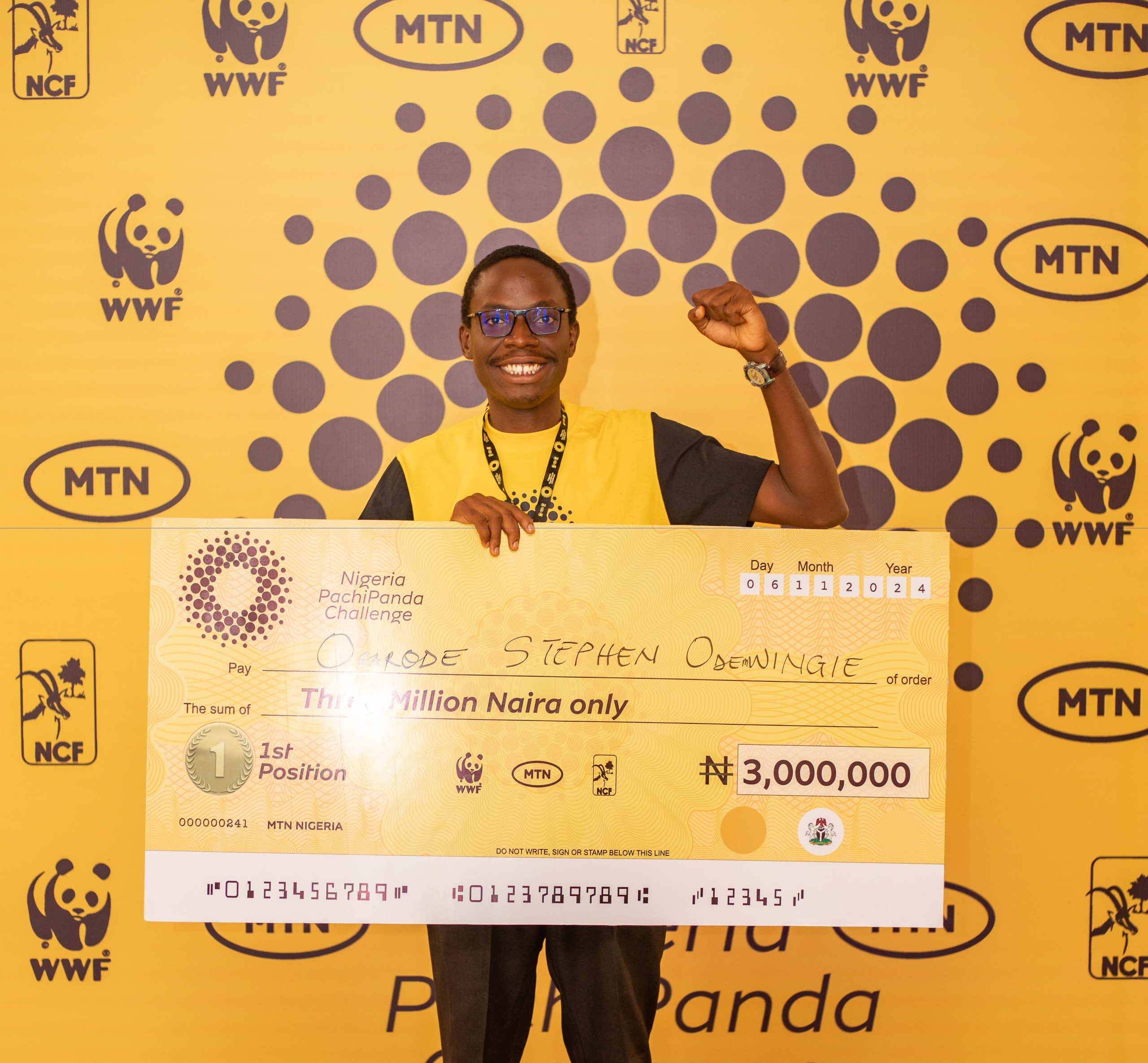General
Success Story: Winner of MTN Nigeria PachiPanda Challenge Receives N3m Prize
Published
1 year agoon

The MTN Nigeria PachiPanda Challenge concluded with Osarodere Stephen Odemewengie as the winner for his groundbreaking approach to tackling some of Nigeria’s environmental issues.
The challenge attracted 1,643 applicants, ultimately narrowing down to 10 finalists who participated in an intensive, human-centred design sprint.
Read Also:
Each finalist presented their innovative solutions to a panel of judges, who evaluated the pitches based on creativity, feasibility, and potential impact on the environment.
When Stephen was announced as the grand prize winner of MTN Nigeria’s PachiPanda Challenge, his excitement was palpable.
For the Microbiologist and Ecologist, this victory was more than just a prize, it was the culmination of years dedicated to exploring innovative ways to convert organic waste into valuable resources.
“The organic materials in this world can be channelled for the betterment of mankind,” he shared with conviction, reflecting on the purpose that has fuelled his career and led him to the challenge.
Stephen’s journey toward sustainable innovation started during his MSc program when he first prototyped his project.
He used human hair, a resource often discarded, burned, or composted in Nigeria to grow mushrooms. “People were surprised, even shocked, that I would use something from humans to cultivate mushrooms,” he admitted with a chuckle. “But the truth is, human hair is a major waste product here, with tons of it thrown out each year.”
Determined to explore the potential of this neglected resource, he partnered with local barber shops and hair salons to collect hair waste, often facing resistance and suspicion. “I was chased away, told to leave, even accused of being a ‘yahoo,’” he recalled.
Yet, undeterred, he found a few forward-thinking salon owners who supported his vision, allowing him to prove that mushrooms could thrive on a mixture of human hair and sawdust.
Building on the success of his hair-based prototype, Stephen expanded his research to test other forms of organic waste, eventually choosing chicken feathers and fruit waste for the PachiPanda Challenge.
These waste materials are prevalent in Benin City, where he grew up, and they frequently pollute land and water systems. “As a microbiologist and
“Ecologist, I wanted to make something useful out of the waste we see everywhere,” he explained. His solution addresses both land and water waste while creating an eco-friendly food source, showing the potential for sustainable agriculture practices that repurpose otherwise discarded materials.
Reflecting on his journey in the challenge, Stephen described the experience as transformative. MTN Nigeria’s hospitality, he noted, went a long way in making the entire event memorable.
“I travelled from Benin City, and it was quite a tiring trip. But when I arrived, MTN welcomed me with open arms,” he said, expressing gratitude for the support of MTN Sustainability team lead, who ensured the participants felt at home. “It allowed me to focus fully on the challenge without distractions,” Stephen added, describing the entire experience as “out of this world.”
Winning the challenge has amplified Stephen’s vision for his project. Currently conducting PhD research on biomass reuse at the University of Benin, he hopes to advance his work in converting organic waste to useful resources, now with the confidence that his work can make a difference.
“We have substantial evidence showing that materials like chicken feathers and fruit waste don’t belong in landfills,” he said.
Stephen’s long-term vision stretches far beyond local applications; he envisions his innovations contributing to the sustainability of future extra-terrestrial habitats.
“With organisations like NASA exploring lunar and Moon habitation, I believe these ideas can be essential for creating food sources in space,” he shared, contemplating the possibility of growing mushrooms on the Moon or Mars to support future human settlers.
For those seeking to make a difference, Stephen’s journey reflects the importance of persistence and value creation.
“Whoever you are, if you focus on providing value, opportunities will find you. When you dedicate yourself to helping others, success will come naturally,” he advised.
His message is clear, keep going, stay centred on adding value, and trust that the right doors will open.
The journey doesn’t end here for Stephen. He will advance to the Pan-African PachiPanda Challenge, where he will compete against other national winners for a chance to scale his solution across the continent.
Share this:
- Click to share on X (Opens in new window) X
- Click to share on Facebook (Opens in new window) Facebook
- Click to share on WhatsApp (Opens in new window) WhatsApp
- Click to share on Pocket (Opens in new window) Pocket
- Click to share on Telegram (Opens in new window) Telegram
- Click to email a link to a friend (Opens in new window) Email
- Click to share on LinkedIn (Opens in new window) LinkedIn
